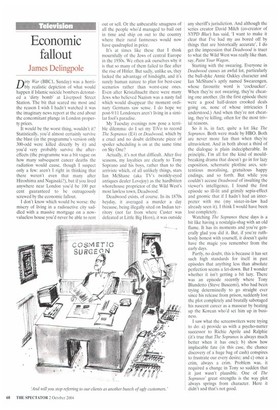Economic fallout
James Delingpole
DiriYWar (BBC1, Sunday) was a horribly realistic depiction of what would happen if Islamic suicide bombers detonated a 'dirty bomb' at Liverpool Street Station. The bit that scared me most and the reason I wish I hadn't watched it was the imaginary news report at the end about the concomitant plunge in London property prices.
It would be the worst thing, wouldn't it? Statistically, you'd almost certainly survive the blast (in the programme's version only 300-odd were killed directly by it) and you'd very probably survive the aftereffects (the programme was a bit vague on how many subsequent cancer deaths the radiation would cause, though I suspect only a few: aren't I right in thinking that there weren't even that many after Hiroshima and Nagasaki?), but if you lived anywhere near London you'd be 100 per cent guaranteed to be outrageously screwed by the economic fallout.
I don't know which would be worse: the misery of living in a radioactive city saddled with a massive mortgage on a nowvalueless house you'd never be able to rent
out or sell. Or the unbearable smugness of all the people who'd managed to bail out in time and ship on out to the country where their rural fastnesses would now have quadrupled in price.
It's at times like these that I think mournfully of the Jews of central Europe in the 1930s. We often ask ourselves why it is that so many of them failed to flee after the rise of Hitler. But sadly, unlike us, they lacked the advantage of hindsight, and it's surely human nature to plan for best-case scenarios rather than worst-case ones. Even after Kristallnacht there were many Jews who believed Nazism was a nasty fad which would disappear the moment ordinary Germans saw sense. I do hope we post-9/11 Londoners aren't living in a similar fool's paradise.
My Tuesday evenings now pose a terrible dilemma: do I set my TiVo to record The Sopranos (E4) or Deadwood, which by a cruel and no doubt deliberate piece of spoiler scheduling is on at the same time on Sky One?
Actually, it's not that difficult. After five seasons, my loyalties are clearly to Tony Soprano and his boys, rather than to the arriviste which, of all unlikely things, stars Ian McShane (aka TV's twinkly-eyed antiques dealer Lovejoy) as the hardbitten whorehouse proprietor of the Wild West's most lawless town, Deadwood.
Deadwood exists, of course. In its 1870s heyday, it averaged a murder a day because, being illegally sited on Indian territory (not far from where Custer was defeated at Little Big Horn), it was outside
any sheriff's jurisdiction. And although the series creator David Mitch (co-creator of NYPD Blue) has said, 'I want to make it clear that I've had my ass bored off by things that are historically accurate', I do get the impression that Deadwood is truer to what the Wild West was really like than, say, Paint Your Wagon.
Starting with the swearing. Everyone in Deadwood cusses an awful lot, particularly the bull-dyke Annie Oakley character and Ian McShane's aptly named Swearengen, whose favourite word is `cocksucker'. When they're not swearing, they're cheating one another. (In the first episode there were a good half-dozen crooked deals going on, none of whose intricacies I understood.) And when they're not cheating, they're killing, often for the most trivial reasons.
So it is, in fact, quite a lot like The Sopranos. Both were made by HBO. Both are never more fun than when they're ultraviolent. And in both about a third of the dialogue is plain indecipherable. In principle, I'm all for the kind of mouldbreaking drama that doesn't go in for lazy exposition, schematic plotline arcs, sententious moralising, gratuitous happy endings, and so forth. But while you couldn't accuse Deadwood of insulting the viewer's intelligence, I found the first
episode so and grimily sepia-effect and gnomic that if I hadn't had an interpreter with me (my sister-in-law had already seen it). I think I would have been lost completely.
Watching The Sopranos these days is a bit like having a nostalgia-shag with an old flame. It has its moments and you're generally glad you did it. But, if you're ruthlessly honest with yourself, it doesn't quite have the magic you remember from the early days.
Partly, no doubt, this is because it has set such high standards for itself in past episodes that anything less than absolute perfection seems a let-down. But I wonder whether it isn't getting a bit lazy. There was an episode recently where Tony Blundetto (Steve Buscemi), who had been trying determinedly to go straight ever since his release from prison, suddenly lost the plot completely and brutally sabotaged his nascent career as a masseur by beating up the Korean who'd set him up in business.
I saw what the screenwriters were trying to do: a) provide us with a psycho-nutter successor to Richie Aprile and Ralphie (it's true that The Sopranos is always much better when it has one); b) show how implacable fate (in this case, the chance discovery of a huge bag of cash) conspires to frustrate our every desire; and c) once a crim, always a crim. Problem was, it required a change in Tony so sudden that it just wasn't plausible. One of The Sopranos' great strengths is the way plot always springs from character. Here it didn't and that's not good.


















































































 Previous page
Previous page